Business Ethics: Unethical Practices and Case Study Analysis
VerifiedAdded on 2020/06/04
|18
|3773
|57
Report
AI Summary
This report delves into the critical field of business ethics, examining established codes of conduct and the ethical challenges faced by organizations. It explores various ethical problems, including sexual harassment, corporate communication issues, and social responsibility, while also discussing ethical theories like utilitarianism and virtue theory. The report uses case studies of companies like Toyota, McDonald's, Nestle, Halliburton, Apple, Starbucks, Trafigura, Samsung, and Walmart to illustrate unethical practices such as product liability failures, misleading advertising, labor exploitation, and environmental damage. The analysis highlights the consequences of these unethical behaviors and emphasizes the importance of ethical principles in guiding employee conduct and ensuring business success. The report also touches on the concept of capitalism and its inherent instabilities, alongside the legal considerations of product liability. This report provides a comprehensive overview of business ethics, offering insights into real-world scenarios and ethical frameworks to understand and navigate the complexities of the business world.
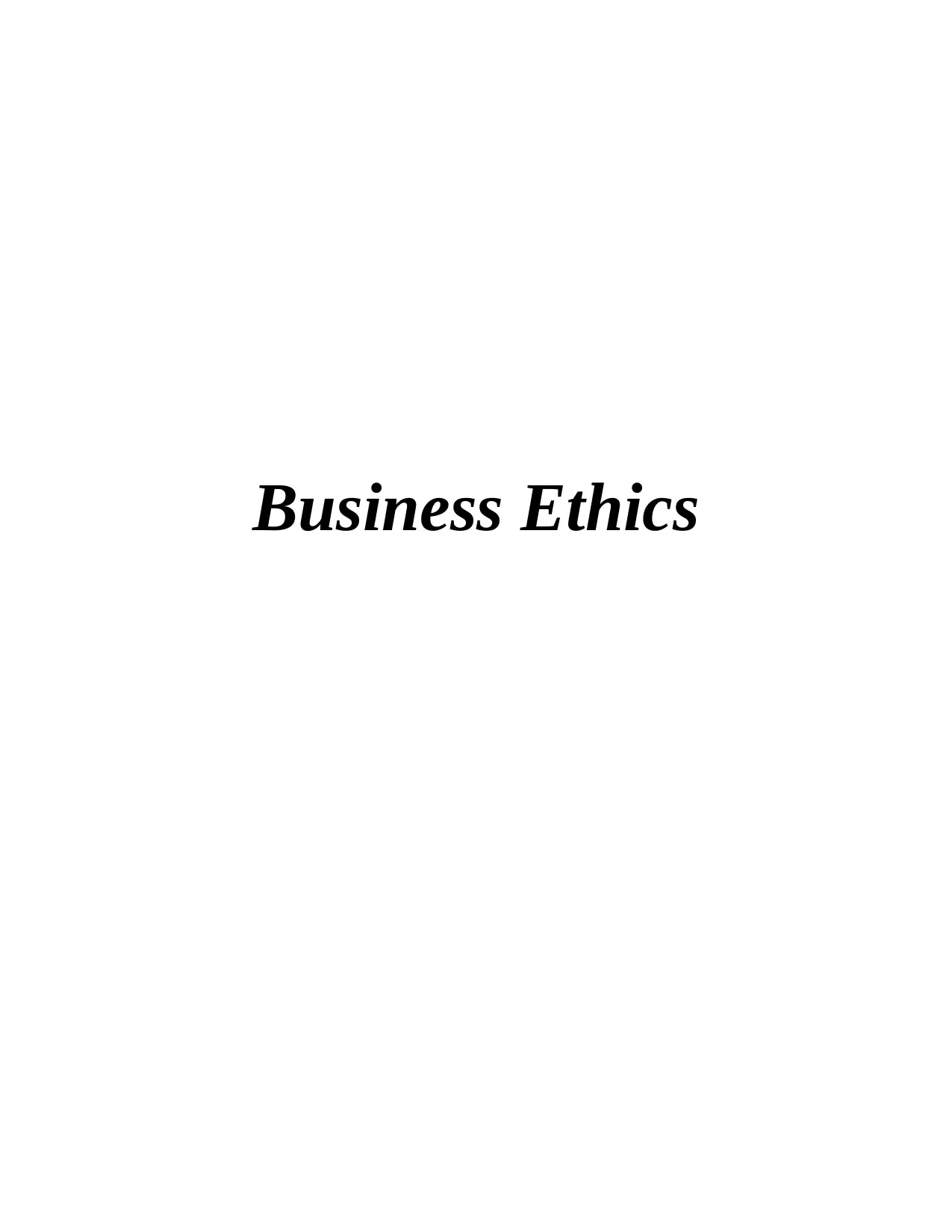
Business Ethics
Paraphrase This Document
Need a fresh take? Get an instant paraphrase of this document with our AI Paraphraser
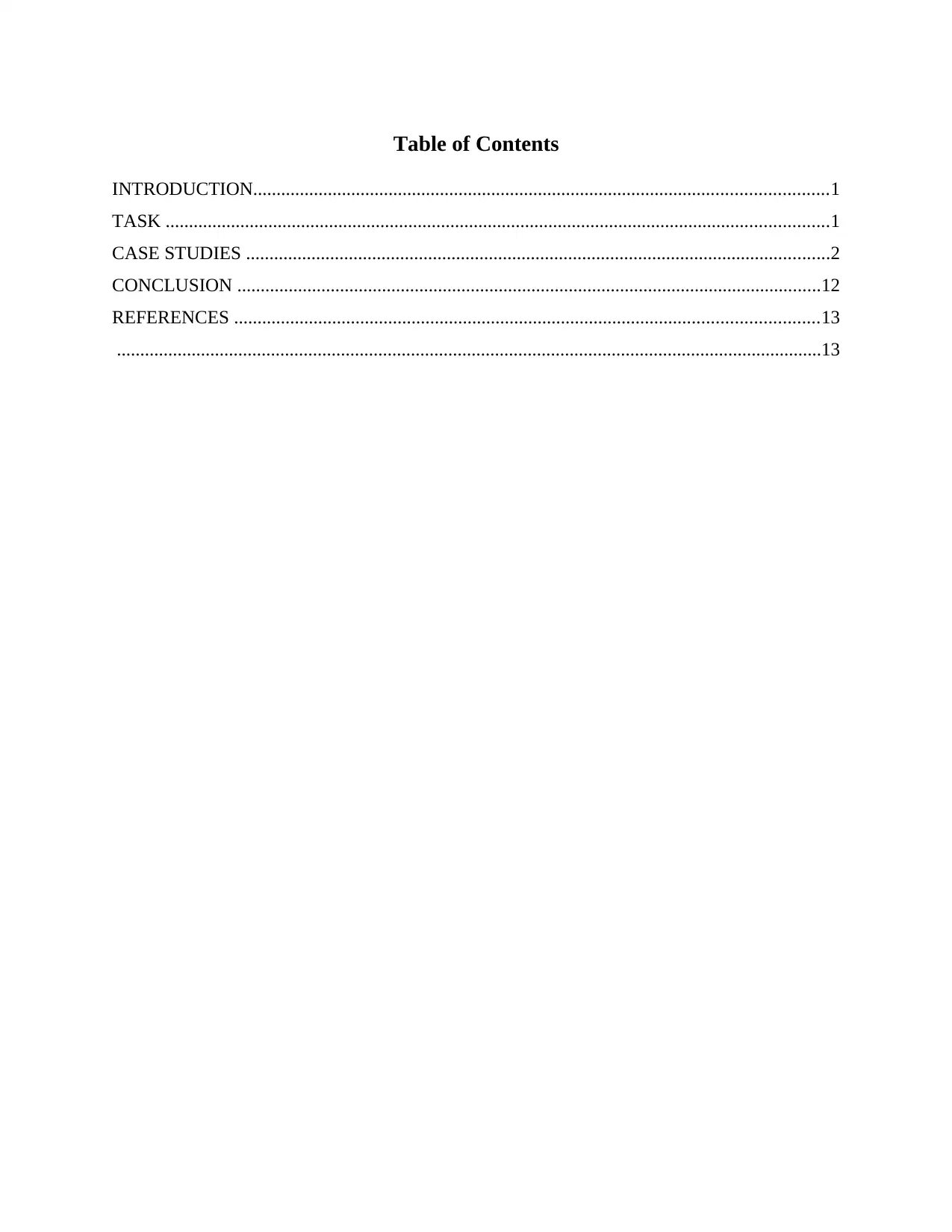
Table of Contents
INTRODUCTION...........................................................................................................................1
TASK ..............................................................................................................................................1
CASE STUDIES .............................................................................................................................2
CONCLUSION .............................................................................................................................12
REFERENCES .............................................................................................................................13
.......................................................................................................................................................13
INTRODUCTION...........................................................................................................................1
TASK ..............................................................................................................................................1
CASE STUDIES .............................................................................................................................2
CONCLUSION .............................................................................................................................12
REFERENCES .............................................................................................................................13
.......................................................................................................................................................13
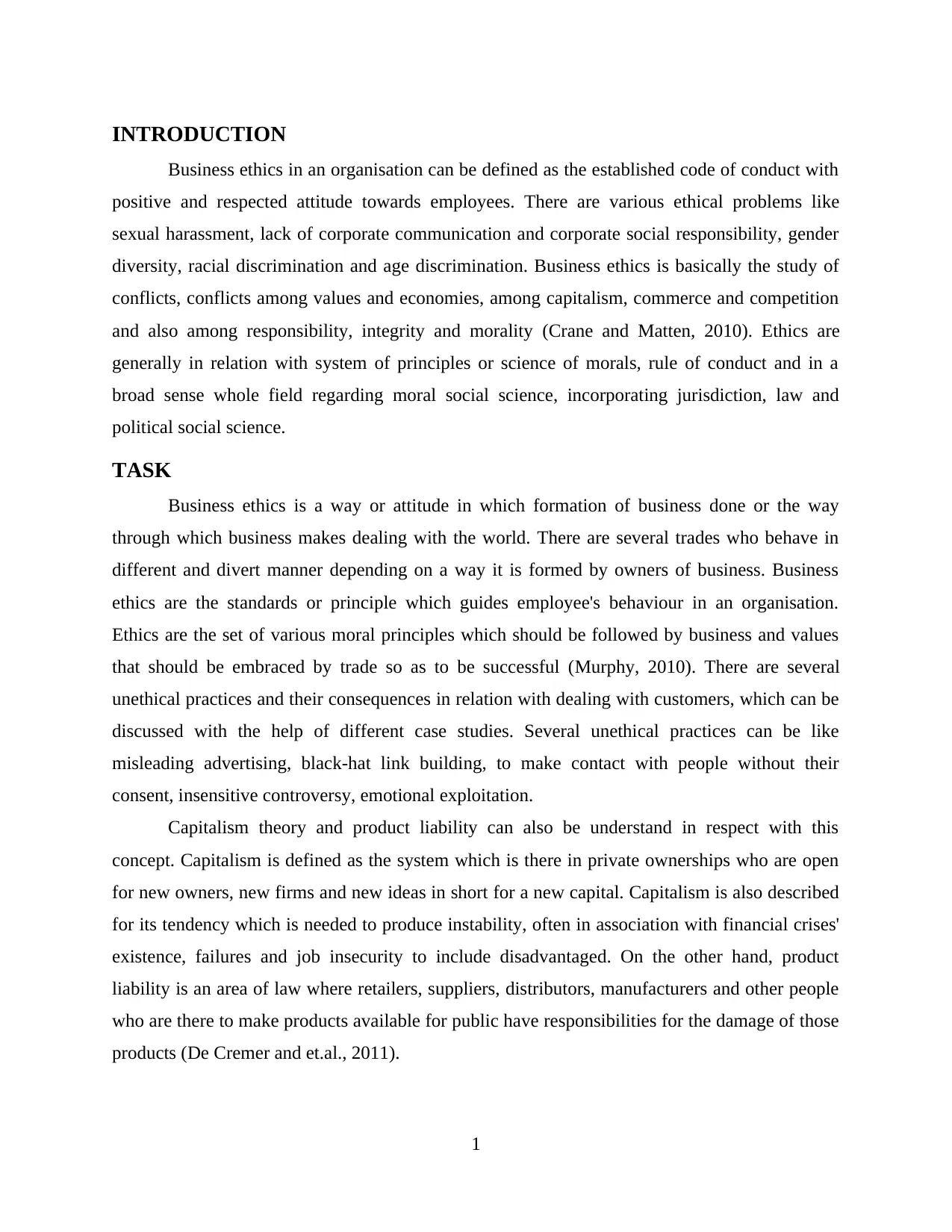
INTRODUCTION
Business ethics in an organisation can be defined as the established code of conduct with
positive and respected attitude towards employees. There are various ethical problems like
sexual harassment, lack of corporate communication and corporate social responsibility, gender
diversity, racial discrimination and age discrimination. Business ethics is basically the study of
conflicts, conflicts among values and economies, among capitalism, commerce and competition
and also among responsibility, integrity and morality (Crane and Matten, 2010). Ethics are
generally in relation with system of principles or science of morals, rule of conduct and in a
broad sense whole field regarding moral social science, incorporating jurisdiction, law and
political social science.
TASK
Business ethics is a way or attitude in which formation of business done or the way
through which business makes dealing with the world. There are several trades who behave in
different and divert manner depending on a way it is formed by owners of business. Business
ethics are the standards or principle which guides employee's behaviour in an organisation.
Ethics are the set of various moral principles which should be followed by business and values
that should be embraced by trade so as to be successful (Murphy, 2010). There are several
unethical practices and their consequences in relation with dealing with customers, which can be
discussed with the help of different case studies. Several unethical practices can be like
misleading advertising, black-hat link building, to make contact with people without their
consent, insensitive controversy, emotional exploitation.
Capitalism theory and product liability can also be understand in respect with this
concept. Capitalism is defined as the system which is there in private ownerships who are open
for new owners, new firms and new ideas in short for a new capital. Capitalism is also described
for its tendency which is needed to produce instability, often in association with financial crises'
existence, failures and job insecurity to include disadvantaged. On the other hand, product
liability is an area of law where retailers, suppliers, distributors, manufacturers and other people
who are there to make products available for public have responsibilities for the damage of those
products (De Cremer and et.al., 2011).
1
Business ethics in an organisation can be defined as the established code of conduct with
positive and respected attitude towards employees. There are various ethical problems like
sexual harassment, lack of corporate communication and corporate social responsibility, gender
diversity, racial discrimination and age discrimination. Business ethics is basically the study of
conflicts, conflicts among values and economies, among capitalism, commerce and competition
and also among responsibility, integrity and morality (Crane and Matten, 2010). Ethics are
generally in relation with system of principles or science of morals, rule of conduct and in a
broad sense whole field regarding moral social science, incorporating jurisdiction, law and
political social science.
TASK
Business ethics is a way or attitude in which formation of business done or the way
through which business makes dealing with the world. There are several trades who behave in
different and divert manner depending on a way it is formed by owners of business. Business
ethics are the standards or principle which guides employee's behaviour in an organisation.
Ethics are the set of various moral principles which should be followed by business and values
that should be embraced by trade so as to be successful (Murphy, 2010). There are several
unethical practices and their consequences in relation with dealing with customers, which can be
discussed with the help of different case studies. Several unethical practices can be like
misleading advertising, black-hat link building, to make contact with people without their
consent, insensitive controversy, emotional exploitation.
Capitalism theory and product liability can also be understand in respect with this
concept. Capitalism is defined as the system which is there in private ownerships who are open
for new owners, new firms and new ideas in short for a new capital. Capitalism is also described
for its tendency which is needed to produce instability, often in association with financial crises'
existence, failures and job insecurity to include disadvantaged. On the other hand, product
liability is an area of law where retailers, suppliers, distributors, manufacturers and other people
who are there to make products available for public have responsibilities for the damage of those
products (De Cremer and et.al., 2011).
1
⊘ This is a preview!⊘
Do you want full access?
Subscribe today to unlock all pages.

Trusted by 1+ million students worldwide
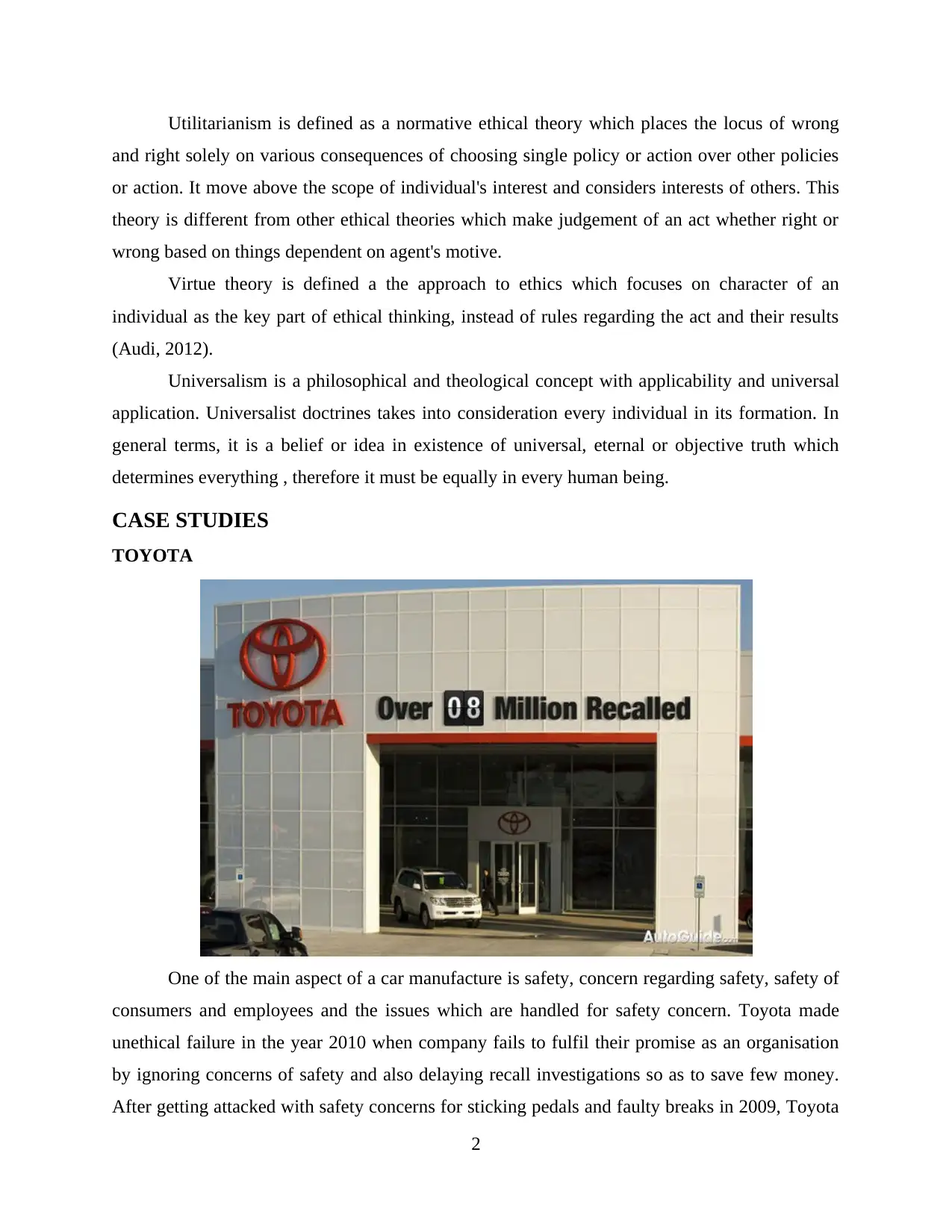
Utilitarianism is defined as a normative ethical theory which places the locus of wrong
and right solely on various consequences of choosing single policy or action over other policies
or action. It move above the scope of individual's interest and considers interests of others. This
theory is different from other ethical theories which make judgement of an act whether right or
wrong based on things dependent on agent's motive.
Virtue theory is defined a the approach to ethics which focuses on character of an
individual as the key part of ethical thinking, instead of rules regarding the act and their results
(Audi, 2012).
Universalism is a philosophical and theological concept with applicability and universal
application. Universalist doctrines takes into consideration every individual in its formation. In
general terms, it is a belief or idea in existence of universal, eternal or objective truth which
determines everything , therefore it must be equally in every human being.
CASE STUDIES
TOYOTA
One of the main aspect of a car manufacture is safety, concern regarding safety, safety of
consumers and employees and the issues which are handled for safety concern. Toyota made
unethical failure in the year 2010 when company fails to fulfil their promise as an organisation
by ignoring concerns of safety and also delaying recall investigations so as to save few money.
After getting attacked with safety concerns for sticking pedals and faulty breaks in 2009, Toyota
2
and right solely on various consequences of choosing single policy or action over other policies
or action. It move above the scope of individual's interest and considers interests of others. This
theory is different from other ethical theories which make judgement of an act whether right or
wrong based on things dependent on agent's motive.
Virtue theory is defined a the approach to ethics which focuses on character of an
individual as the key part of ethical thinking, instead of rules regarding the act and their results
(Audi, 2012).
Universalism is a philosophical and theological concept with applicability and universal
application. Universalist doctrines takes into consideration every individual in its formation. In
general terms, it is a belief or idea in existence of universal, eternal or objective truth which
determines everything , therefore it must be equally in every human being.
CASE STUDIES
TOYOTA
One of the main aspect of a car manufacture is safety, concern regarding safety, safety of
consumers and employees and the issues which are handled for safety concern. Toyota made
unethical failure in the year 2010 when company fails to fulfil their promise as an organisation
by ignoring concerns of safety and also delaying recall investigations so as to save few money.
After getting attacked with safety concerns for sticking pedals and faulty breaks in 2009, Toyota
2
Paraphrase This Document
Need a fresh take? Get an instant paraphrase of this document with our AI Paraphraser
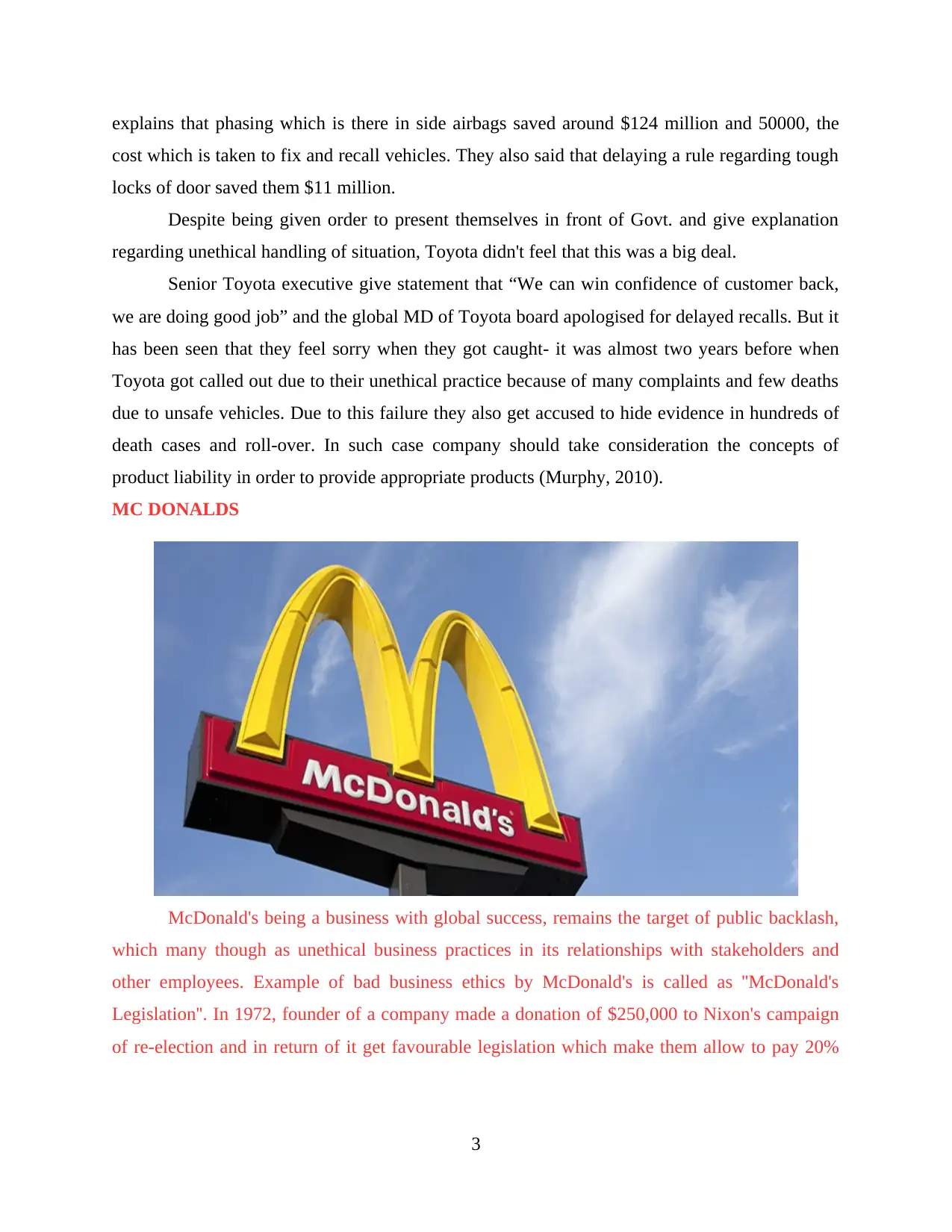
explains that phasing which is there in side airbags saved around $124 million and 50000, the
cost which is taken to fix and recall vehicles. They also said that delaying a rule regarding tough
locks of door saved them $11 million.
Despite being given order to present themselves in front of Govt. and give explanation
regarding unethical handling of situation, Toyota didn't feel that this was a big deal.
Senior Toyota executive give statement that “We can win confidence of customer back,
we are doing good job” and the global MD of Toyota board apologised for delayed recalls. But it
has been seen that they feel sorry when they got caught- it was almost two years before when
Toyota got called out due to their unethical practice because of many complaints and few deaths
due to unsafe vehicles. Due to this failure they also get accused to hide evidence in hundreds of
death cases and roll-over. In such case company should take consideration the concepts of
product liability in order to provide appropriate products (Murphy, 2010).
MC DONALDS
McDonald's being a business with global success, remains the target of public backlash,
which many though as unethical business practices in its relationships with stakeholders and
other employees. Example of bad business ethics by McDonald's is called as ''McDonald's
Legislation''. In 1972, founder of a company made a donation of $250,000 to Nixon's campaign
of re-election and in return of it get favourable legislation which make them allow to pay 20%
3
cost which is taken to fix and recall vehicles. They also said that delaying a rule regarding tough
locks of door saved them $11 million.
Despite being given order to present themselves in front of Govt. and give explanation
regarding unethical handling of situation, Toyota didn't feel that this was a big deal.
Senior Toyota executive give statement that “We can win confidence of customer back,
we are doing good job” and the global MD of Toyota board apologised for delayed recalls. But it
has been seen that they feel sorry when they got caught- it was almost two years before when
Toyota got called out due to their unethical practice because of many complaints and few deaths
due to unsafe vehicles. Due to this failure they also get accused to hide evidence in hundreds of
death cases and roll-over. In such case company should take consideration the concepts of
product liability in order to provide appropriate products (Murphy, 2010).
MC DONALDS
McDonald's being a business with global success, remains the target of public backlash,
which many though as unethical business practices in its relationships with stakeholders and
other employees. Example of bad business ethics by McDonald's is called as ''McDonald's
Legislation''. In 1972, founder of a company made a donation of $250,000 to Nixon's campaign
of re-election and in return of it get favourable legislation which make them allow to pay 20%
3
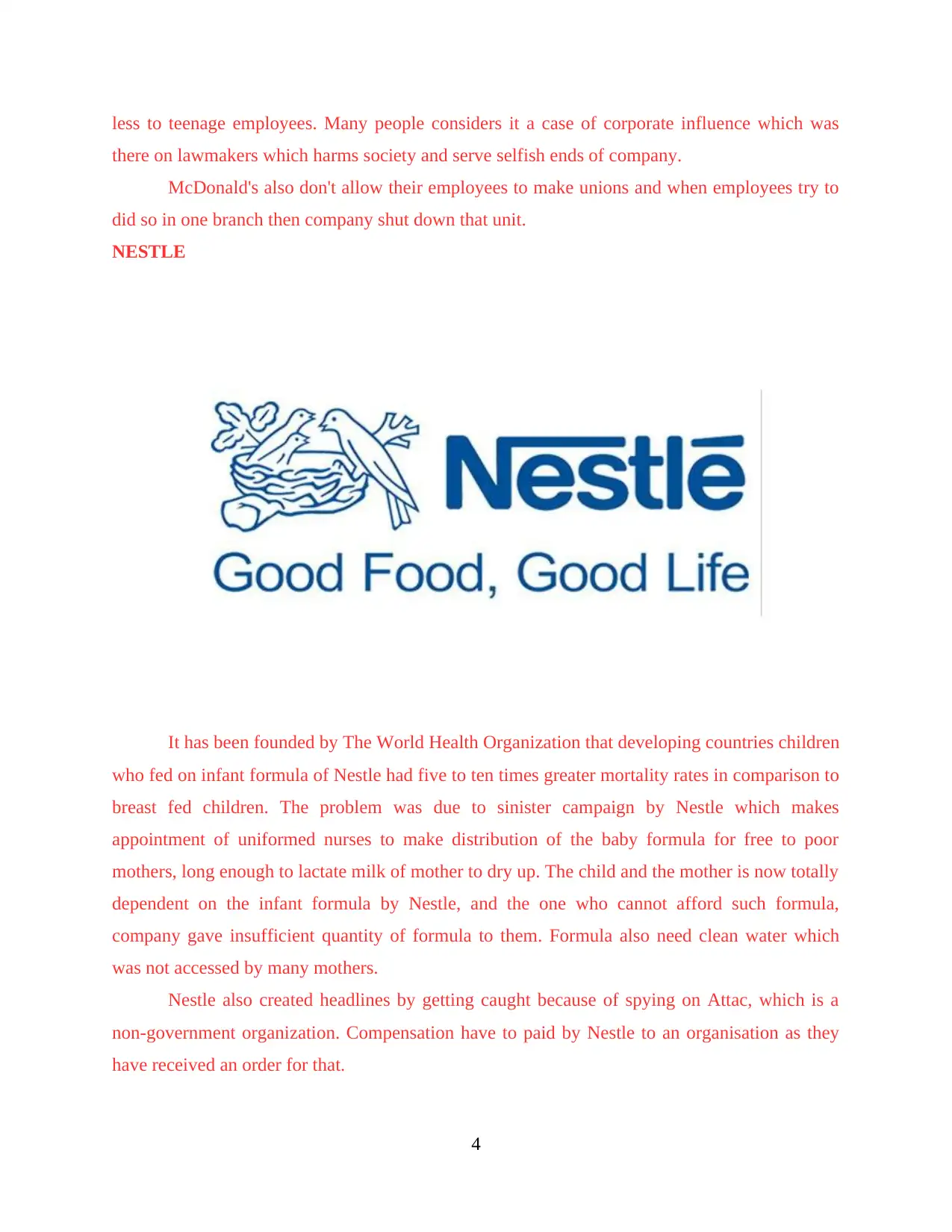
less to teenage employees. Many people considers it a case of corporate influence which was
there on lawmakers which harms society and serve selfish ends of company.
McDonald's also don't allow their employees to make unions and when employees try to
did so in one branch then company shut down that unit.
NESTLE
It has been founded by The World Health Organization that developing countries children
who fed on infant formula of Nestle had five to ten times greater mortality rates in comparison to
breast fed children. The problem was due to sinister campaign by Nestle which makes
appointment of uniformed nurses to make distribution of the baby formula for free to poor
mothers, long enough to lactate milk of mother to dry up. The child and the mother is now totally
dependent on the infant formula by Nestle, and the one who cannot afford such formula,
company gave insufficient quantity of formula to them. Formula also need clean water which
was not accessed by many mothers.
Nestle also created headlines by getting caught because of spying on Attac, which is a
non-government organization. Compensation have to paid by Nestle to an organisation as they
have received an order for that.
4
there on lawmakers which harms society and serve selfish ends of company.
McDonald's also don't allow their employees to make unions and when employees try to
did so in one branch then company shut down that unit.
NESTLE
It has been founded by The World Health Organization that developing countries children
who fed on infant formula of Nestle had five to ten times greater mortality rates in comparison to
breast fed children. The problem was due to sinister campaign by Nestle which makes
appointment of uniformed nurses to make distribution of the baby formula for free to poor
mothers, long enough to lactate milk of mother to dry up. The child and the mother is now totally
dependent on the infant formula by Nestle, and the one who cannot afford such formula,
company gave insufficient quantity of formula to them. Formula also need clean water which
was not accessed by many mothers.
Nestle also created headlines by getting caught because of spying on Attac, which is a
non-government organization. Compensation have to paid by Nestle to an organisation as they
have received an order for that.
4
⊘ This is a preview!⊘
Do you want full access?
Subscribe today to unlock all pages.

Trusted by 1+ million students worldwide
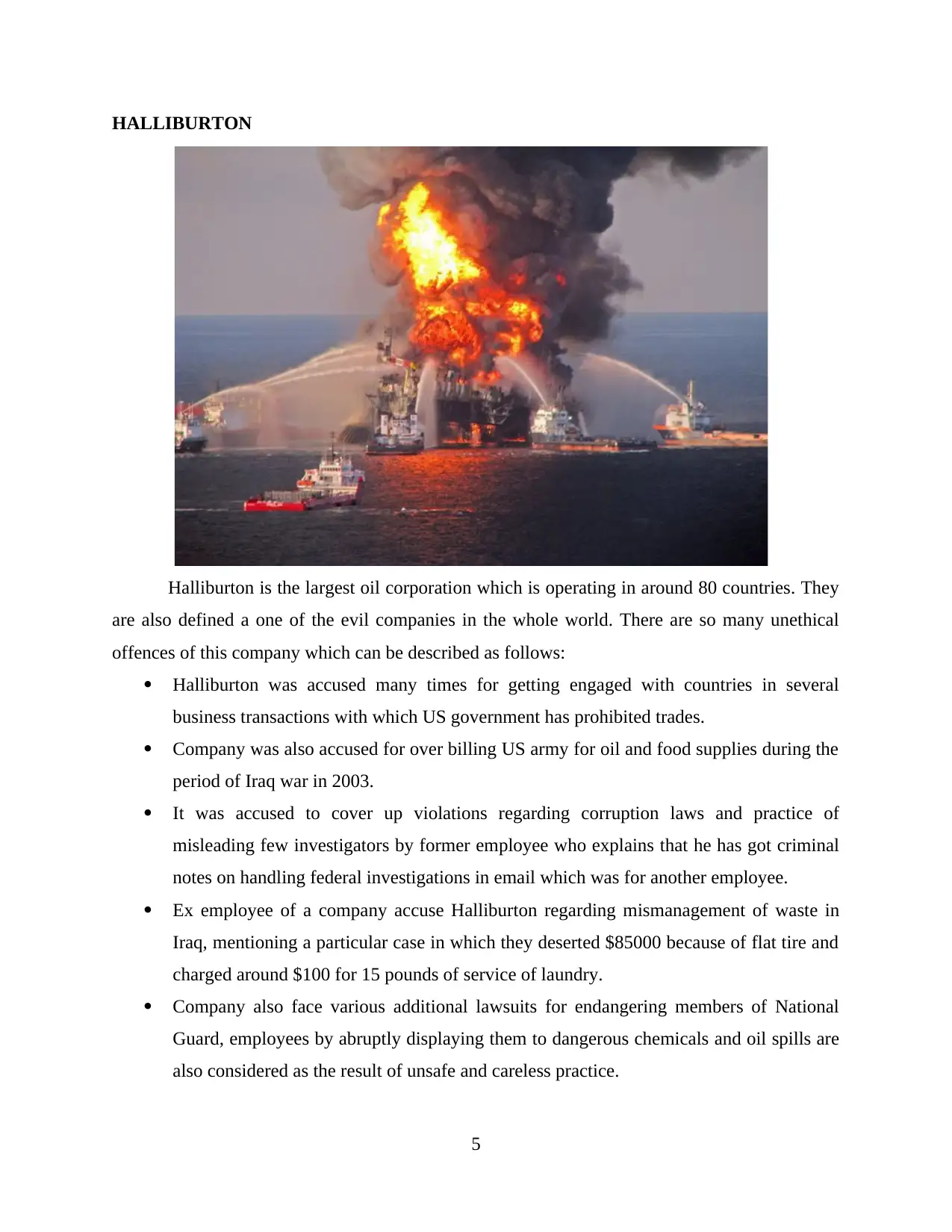
HALLIBURTON
Halliburton is the largest oil corporation which is operating in around 80 countries. They
are also defined a one of the evil companies in the whole world. There are so many unethical
offences of this company which can be described as follows:
Halliburton was accused many times for getting engaged with countries in several
business transactions with which US government has prohibited trades.
Company was also accused for over billing US army for oil and food supplies during the
period of Iraq war in 2003.
It was accused to cover up violations regarding corruption laws and practice of
misleading few investigators by former employee who explains that he has got criminal
notes on handling federal investigations in email which was for another employee.
Ex employee of a company accuse Halliburton regarding mismanagement of waste in
Iraq, mentioning a particular case in which they deserted $85000 because of flat tire and
charged around $100 for 15 pounds of service of laundry.
Company also face various additional lawsuits for endangering members of National
Guard, employees by abruptly displaying them to dangerous chemicals and oil spills are
also considered as the result of unsafe and careless practice.
5
Halliburton is the largest oil corporation which is operating in around 80 countries. They
are also defined a one of the evil companies in the whole world. There are so many unethical
offences of this company which can be described as follows:
Halliburton was accused many times for getting engaged with countries in several
business transactions with which US government has prohibited trades.
Company was also accused for over billing US army for oil and food supplies during the
period of Iraq war in 2003.
It was accused to cover up violations regarding corruption laws and practice of
misleading few investigators by former employee who explains that he has got criminal
notes on handling federal investigations in email which was for another employee.
Ex employee of a company accuse Halliburton regarding mismanagement of waste in
Iraq, mentioning a particular case in which they deserted $85000 because of flat tire and
charged around $100 for 15 pounds of service of laundry.
Company also face various additional lawsuits for endangering members of National
Guard, employees by abruptly displaying them to dangerous chemicals and oil spills are
also considered as the result of unsafe and careless practice.
5
Paraphrase This Document
Need a fresh take? Get an instant paraphrase of this document with our AI Paraphraser
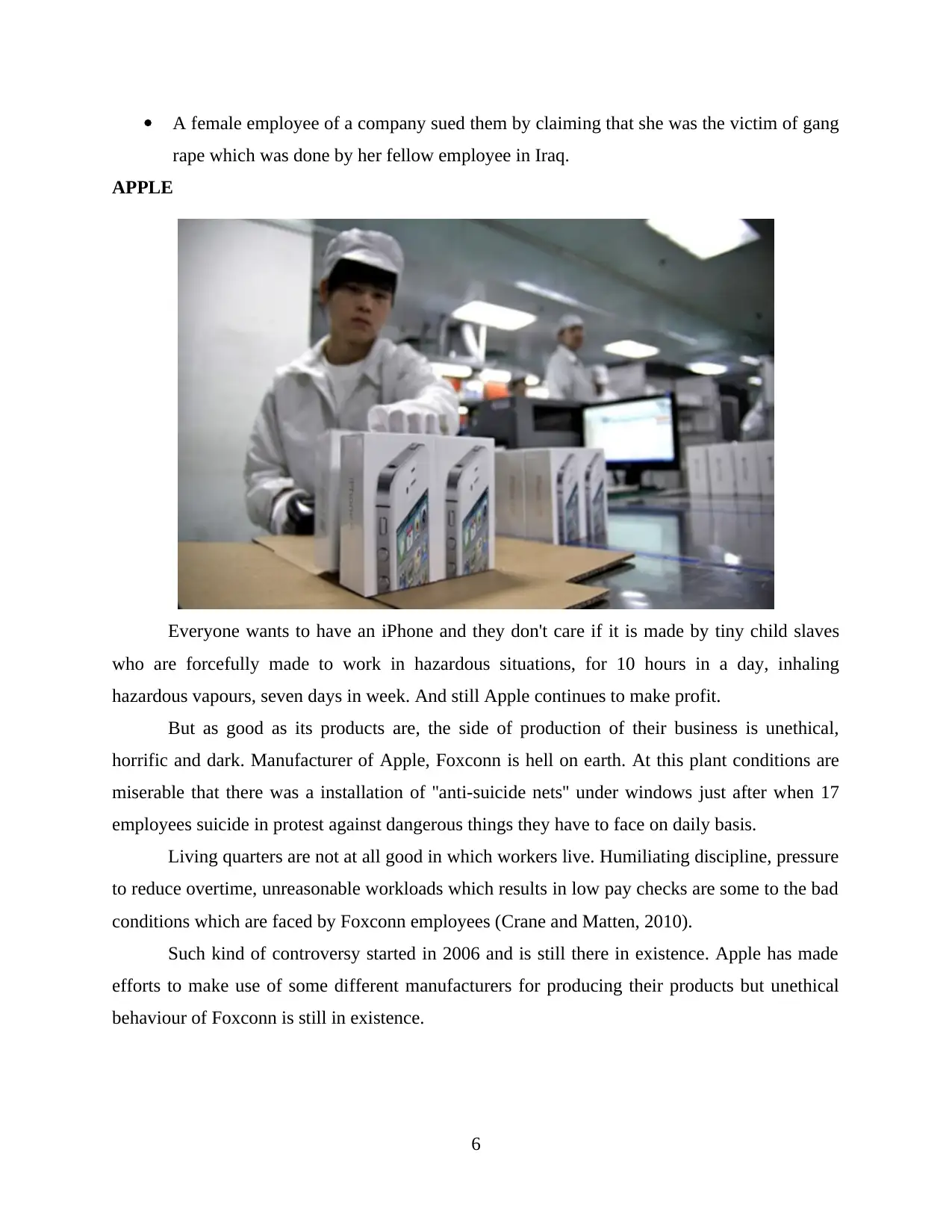
A female employee of a company sued them by claiming that she was the victim of gang
rape which was done by her fellow employee in Iraq.
APPLE
Everyone wants to have an iPhone and they don't care if it is made by tiny child slaves
who are forcefully made to work in hazardous situations, for 10 hours in a day, inhaling
hazardous vapours, seven days in week. And still Apple continues to make profit.
But as good as its products are, the side of production of their business is unethical,
horrific and dark. Manufacturer of Apple, Foxconn is hell on earth. At this plant conditions are
miserable that there was a installation of ''anti-suicide nets'' under windows just after when 17
employees suicide in protest against dangerous things they have to face on daily basis.
Living quarters are not at all good in which workers live. Humiliating discipline, pressure
to reduce overtime, unreasonable workloads which results in low pay checks are some to the bad
conditions which are faced by Foxconn employees (Crane and Matten, 2010).
Such kind of controversy started in 2006 and is still there in existence. Apple has made
efforts to make use of some different manufacturers for producing their products but unethical
behaviour of Foxconn is still in existence.
6
rape which was done by her fellow employee in Iraq.
APPLE
Everyone wants to have an iPhone and they don't care if it is made by tiny child slaves
who are forcefully made to work in hazardous situations, for 10 hours in a day, inhaling
hazardous vapours, seven days in week. And still Apple continues to make profit.
But as good as its products are, the side of production of their business is unethical,
horrific and dark. Manufacturer of Apple, Foxconn is hell on earth. At this plant conditions are
miserable that there was a installation of ''anti-suicide nets'' under windows just after when 17
employees suicide in protest against dangerous things they have to face on daily basis.
Living quarters are not at all good in which workers live. Humiliating discipline, pressure
to reduce overtime, unreasonable workloads which results in low pay checks are some to the bad
conditions which are faced by Foxconn employees (Crane and Matten, 2010).
Such kind of controversy started in 2006 and is still there in existence. Apple has made
efforts to make use of some different manufacturers for producing their products but unethical
behaviour of Foxconn is still in existence.
6
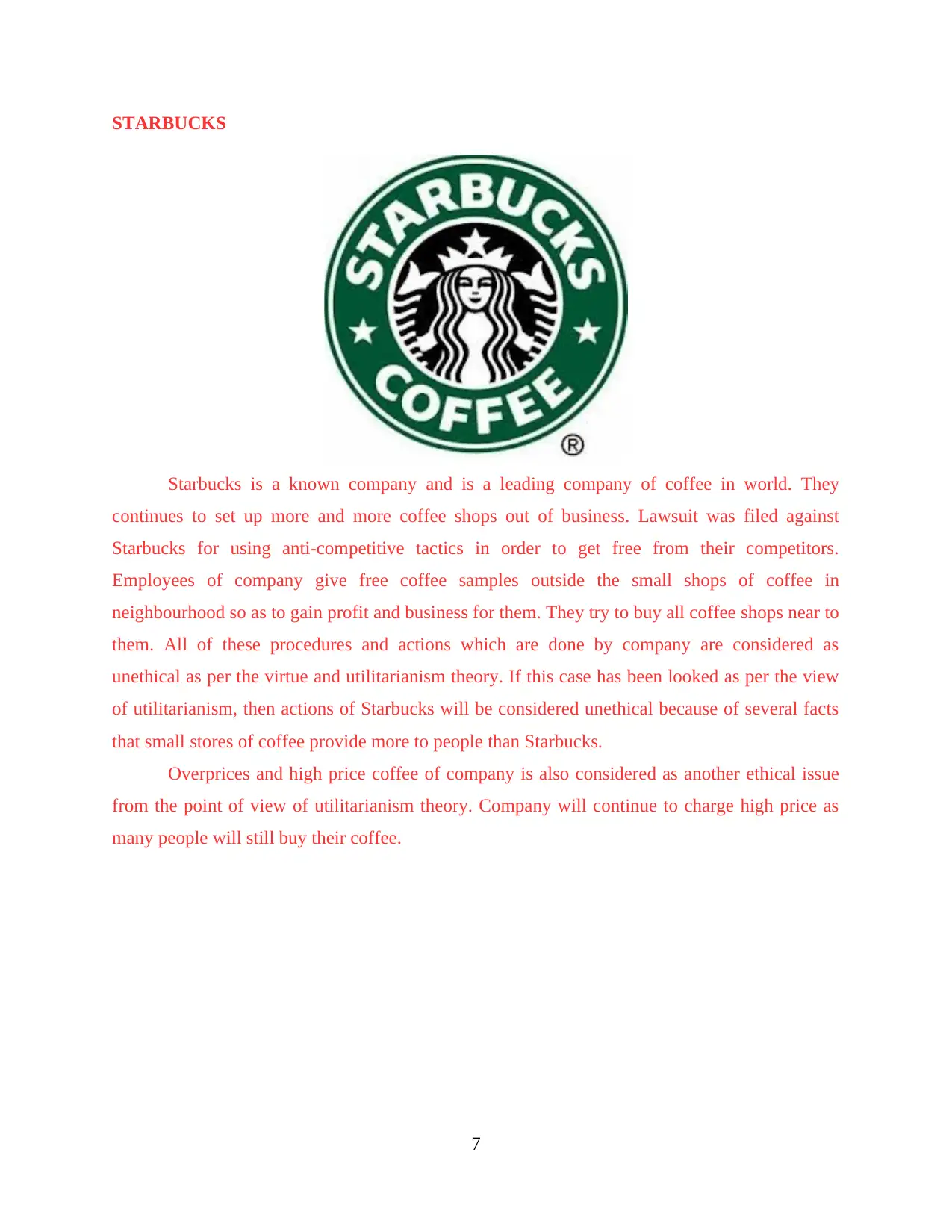
STARBUCKS
Starbucks is a known company and is a leading company of coffee in world. They
continues to set up more and more coffee shops out of business. Lawsuit was filed against
Starbucks for using anti-competitive tactics in order to get free from their competitors.
Employees of company give free coffee samples outside the small shops of coffee in
neighbourhood so as to gain profit and business for them. They try to buy all coffee shops near to
them. All of these procedures and actions which are done by company are considered as
unethical as per the virtue and utilitarianism theory. If this case has been looked as per the view
of utilitarianism, then actions of Starbucks will be considered unethical because of several facts
that small stores of coffee provide more to people than Starbucks.
Overprices and high price coffee of company is also considered as another ethical issue
from the point of view of utilitarianism theory. Company will continue to charge high price as
many people will still buy their coffee.
7
Starbucks is a known company and is a leading company of coffee in world. They
continues to set up more and more coffee shops out of business. Lawsuit was filed against
Starbucks for using anti-competitive tactics in order to get free from their competitors.
Employees of company give free coffee samples outside the small shops of coffee in
neighbourhood so as to gain profit and business for them. They try to buy all coffee shops near to
them. All of these procedures and actions which are done by company are considered as
unethical as per the virtue and utilitarianism theory. If this case has been looked as per the view
of utilitarianism, then actions of Starbucks will be considered unethical because of several facts
that small stores of coffee provide more to people than Starbucks.
Overprices and high price coffee of company is also considered as another ethical issue
from the point of view of utilitarianism theory. Company will continue to charge high price as
many people will still buy their coffee.
7
⊘ This is a preview!⊘
Do you want full access?
Subscribe today to unlock all pages.

Trusted by 1+ million students worldwide
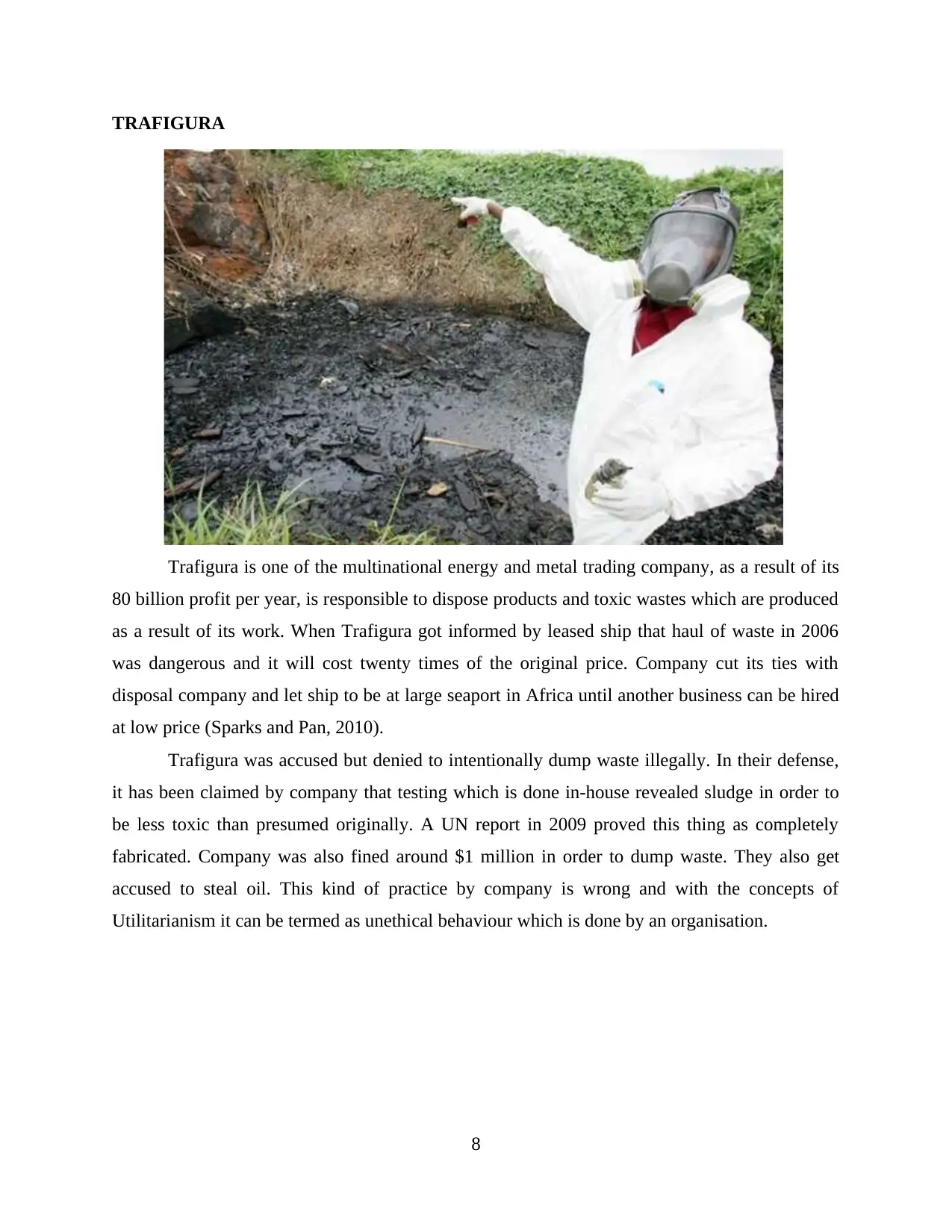
TRAFIGURA
Trafigura is one of the multinational energy and metal trading company, as a result of its
80 billion profit per year, is responsible to dispose products and toxic wastes which are produced
as a result of its work. When Trafigura got informed by leased ship that haul of waste in 2006
was dangerous and it will cost twenty times of the original price. Company cut its ties with
disposal company and let ship to be at large seaport in Africa until another business can be hired
at low price (Sparks and Pan, 2010).
Trafigura was accused but denied to intentionally dump waste illegally. In their defense,
it has been claimed by company that testing which is done in-house revealed sludge in order to
be less toxic than presumed originally. A UN report in 2009 proved this thing as completely
fabricated. Company was also fined around $1 million in order to dump waste. They also get
accused to steal oil. This kind of practice by company is wrong and with the concepts of
Utilitarianism it can be termed as unethical behaviour which is done by an organisation.
8
Trafigura is one of the multinational energy and metal trading company, as a result of its
80 billion profit per year, is responsible to dispose products and toxic wastes which are produced
as a result of its work. When Trafigura got informed by leased ship that haul of waste in 2006
was dangerous and it will cost twenty times of the original price. Company cut its ties with
disposal company and let ship to be at large seaport in Africa until another business can be hired
at low price (Sparks and Pan, 2010).
Trafigura was accused but denied to intentionally dump waste illegally. In their defense,
it has been claimed by company that testing which is done in-house revealed sludge in order to
be less toxic than presumed originally. A UN report in 2009 proved this thing as completely
fabricated. Company was also fined around $1 million in order to dump waste. They also get
accused to steal oil. This kind of practice by company is wrong and with the concepts of
Utilitarianism it can be termed as unethical behaviour which is done by an organisation.
8
Paraphrase This Document
Need a fresh take? Get an instant paraphrase of this document with our AI Paraphraser
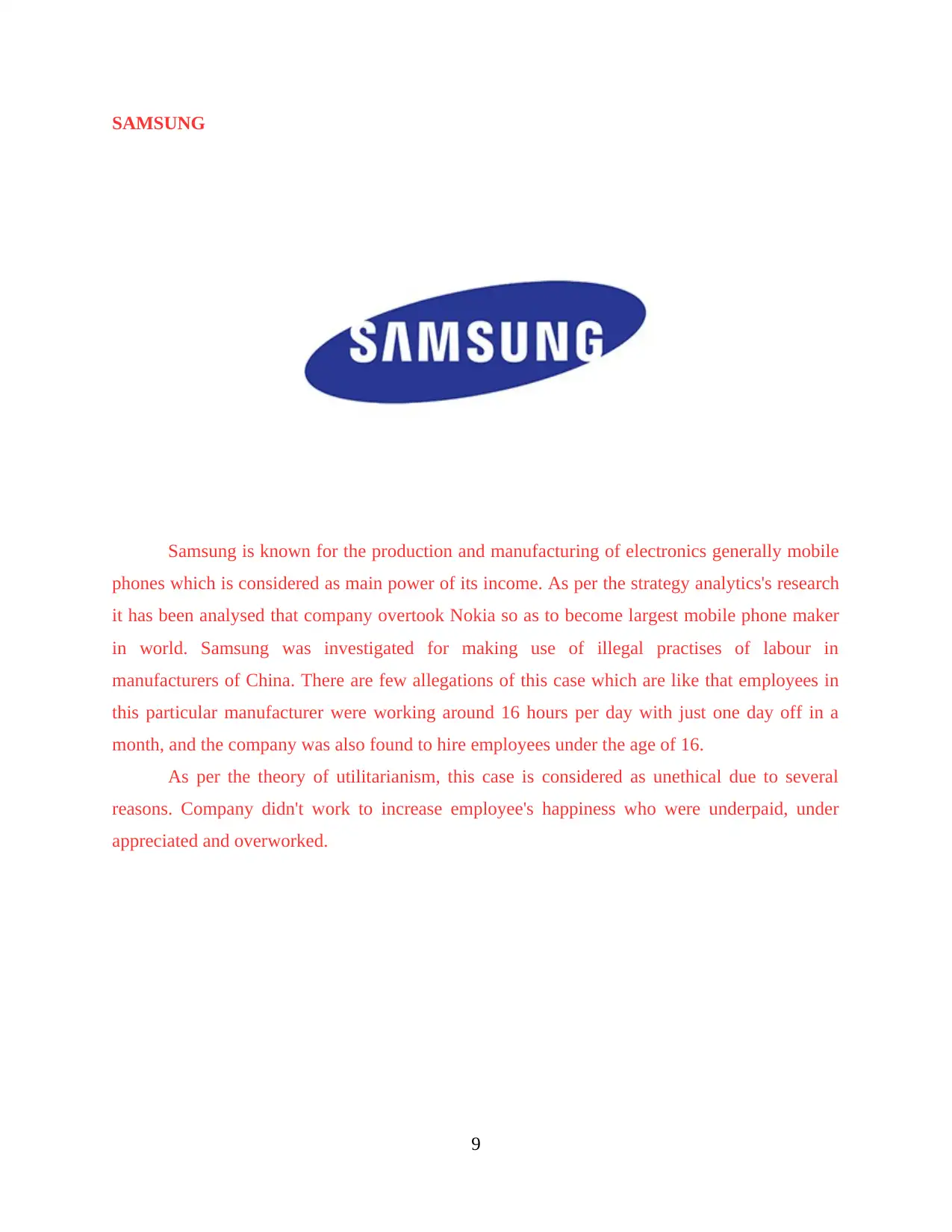
SAMSUNG
Samsung is known for the production and manufacturing of electronics generally mobile
phones which is considered as main power of its income. As per the strategy analytics's research
it has been analysed that company overtook Nokia so as to become largest mobile phone maker
in world. Samsung was investigated for making use of illegal practises of labour in
manufacturers of China. There are few allegations of this case which are like that employees in
this particular manufacturer were working around 16 hours per day with just one day off in a
month, and the company was also found to hire employees under the age of 16.
As per the theory of utilitarianism, this case is considered as unethical due to several
reasons. Company didn't work to increase employee's happiness who were underpaid, under
appreciated and overworked.
9
Samsung is known for the production and manufacturing of electronics generally mobile
phones which is considered as main power of its income. As per the strategy analytics's research
it has been analysed that company overtook Nokia so as to become largest mobile phone maker
in world. Samsung was investigated for making use of illegal practises of labour in
manufacturers of China. There are few allegations of this case which are like that employees in
this particular manufacturer were working around 16 hours per day with just one day off in a
month, and the company was also found to hire employees under the age of 16.
As per the theory of utilitarianism, this case is considered as unethical due to several
reasons. Company didn't work to increase employee's happiness who were underpaid, under
appreciated and overworked.
9
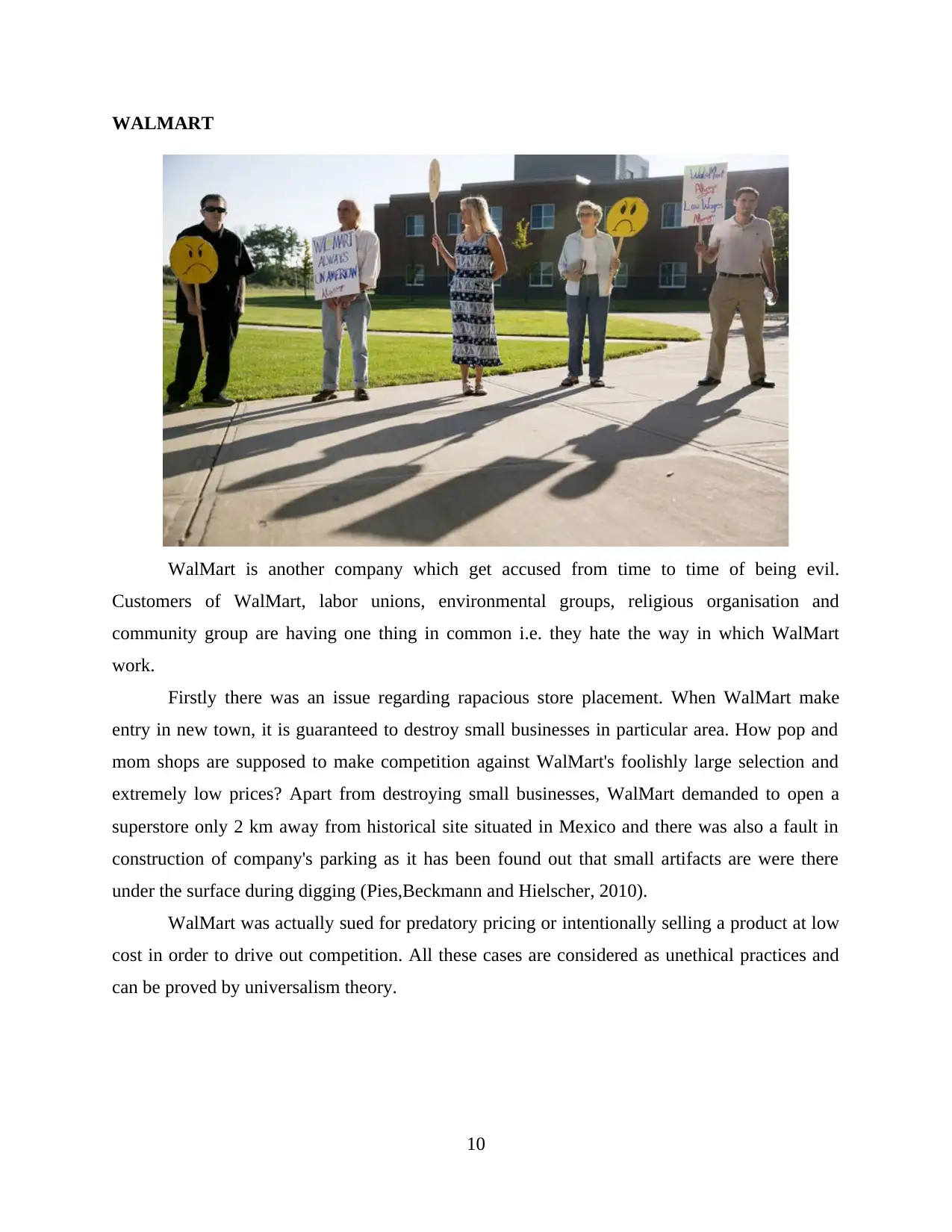
WALMART
WalMart is another company which get accused from time to time of being evil.
Customers of WalMart, labor unions, environmental groups, religious organisation and
community group are having one thing in common i.e. they hate the way in which WalMart
work.
Firstly there was an issue regarding rapacious store placement. When WalMart make
entry in new town, it is guaranteed to destroy small businesses in particular area. How pop and
mom shops are supposed to make competition against WalMart's foolishly large selection and
extremely low prices? Apart from destroying small businesses, WalMart demanded to open a
superstore only 2 km away from historical site situated in Mexico and there was also a fault in
construction of company's parking as it has been found out that small artifacts are were there
under the surface during digging (Pies,Beckmann and Hielscher, 2010).
WalMart was actually sued for predatory pricing or intentionally selling a product at low
cost in order to drive out competition. All these cases are considered as unethical practices and
can be proved by universalism theory.
10
WalMart is another company which get accused from time to time of being evil.
Customers of WalMart, labor unions, environmental groups, religious organisation and
community group are having one thing in common i.e. they hate the way in which WalMart
work.
Firstly there was an issue regarding rapacious store placement. When WalMart make
entry in new town, it is guaranteed to destroy small businesses in particular area. How pop and
mom shops are supposed to make competition against WalMart's foolishly large selection and
extremely low prices? Apart from destroying small businesses, WalMart demanded to open a
superstore only 2 km away from historical site situated in Mexico and there was also a fault in
construction of company's parking as it has been found out that small artifacts are were there
under the surface during digging (Pies,Beckmann and Hielscher, 2010).
WalMart was actually sued for predatory pricing or intentionally selling a product at low
cost in order to drive out competition. All these cases are considered as unethical practices and
can be proved by universalism theory.
10
⊘ This is a preview!⊘
Do you want full access?
Subscribe today to unlock all pages.

Trusted by 1+ million students worldwide
1 out of 18
Related Documents
Your All-in-One AI-Powered Toolkit for Academic Success.
+13062052269
info@desklib.com
Available 24*7 on WhatsApp / Email
![[object Object]](/_next/static/media/star-bottom.7253800d.svg)
Unlock your academic potential
Copyright © 2020–2026 A2Z Services. All Rights Reserved. Developed and managed by ZUCOL.




